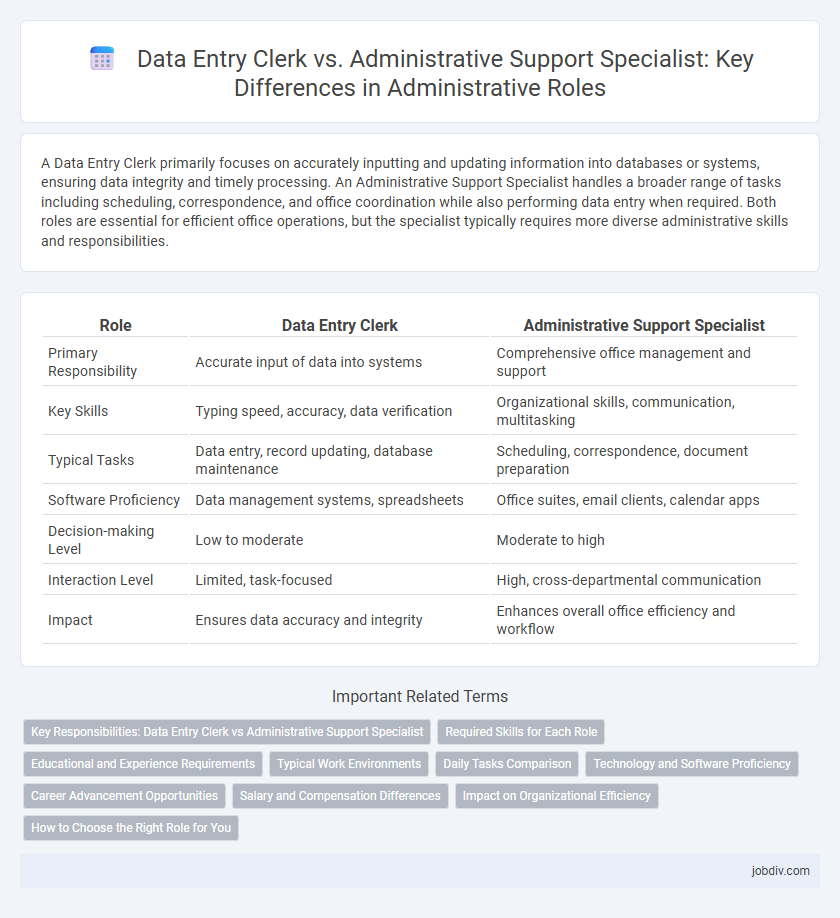A Data Entry Clerk primarily focuses on accurately inputting and updating information into databases or systems, ensuring data integrity and timely processing. An Administrative Support Specialist handles a broader range of tasks including scheduling, correspondence, and office coordination while also performing data entry when required. Both roles are essential for efficient office operations, but the specialist typically requires more diverse administrative skills and responsibilities.
Table of Comparison
| Role | Data Entry Clerk | Administrative Support Specialist |
|---|---|---|
| Primary Responsibility | Accurate input of data into systems | Comprehensive office management and support |
| Key Skills | Typing speed, accuracy, data verification | Organizational skills, communication, multitasking |
| Typical Tasks | Data entry, record updating, database maintenance | Scheduling, correspondence, document preparation |
| Software Proficiency | Data management systems, spreadsheets | Office suites, email clients, calendar apps |
| Decision-making Level | Low to moderate | Moderate to high |
| Interaction Level | Limited, task-focused | High, cross-departmental communication |
| Impact | Ensures data accuracy and integrity | Enhances overall office efficiency and workflow |
Key Responsibilities: Data Entry Clerk vs Administrative Support Specialist
Data Entry Clerks primarily focus on accurately inputting, updating, and maintaining data in databases or information systems, ensuring data integrity and efficiency. Administrative Support Specialists handle a broader range of responsibilities including managing correspondence, scheduling appointments, preparing reports, and supporting office operations alongside data management tasks. Both roles require attention to detail and organizational skills, but Administrative Support Specialists often engage in more complex administrative functions beyond data entry.
Required Skills for Each Role
Data Entry Clerks require strong typing skills, attention to detail, and proficiency with database management software to ensure accurate and efficient input of information. Administrative Support Specialists need advanced organizational abilities, proficiency in office software such as Microsoft Office Suite, and excellent communication skills to manage correspondence, scheduling, and office operations effectively. Both roles benefit from time management skills, but Administrative Support Specialists often require problem-solving capabilities and knowledge of office procedures to support broader administrative functions.
Educational and Experience Requirements
Data Entry Clerks typically require a high school diploma or equivalent, with basic computer skills and minimal formal experience, making entry-level positions accessible. Administrative Support Specialists often need a postsecondary certificate or associate degree, coupled with 1 to 3 years of experience in office administration to proficiently handle complex tasks. Employers prioritize candidates with strong organizational abilities and proficiency in office software for both roles.
Typical Work Environments
Data Entry Clerks typically work in office settings such as corporate offices, healthcare facilities, and government agencies where they handle large volumes of information input and database management. Administrative Support Specialists operate in diverse environments including educational institutions, legal firms, and non-profit organizations, providing comprehensive clerical assistance and coordination support. Both roles require proficiency with office software, but Administrative Support Specialists often engage in more varied tasks across multiple departments.
Daily Tasks Comparison
Data Entry Clerks primarily focus on accurate input and management of information into databases, ensuring error-free records and maintaining data confidentiality. Administrative Support Specialists handle a broader range of responsibilities, including scheduling, correspondence management, and assisting with office operations alongside data entry tasks. While both roles require organizational skills, Administrative Support Specialists engage more in communication and coordination to support overall administrative functions.
Technology and Software Proficiency
Data Entry Clerks primarily utilize basic data management software such as Microsoft Excel and proprietary database systems to input and verify information accurately. Administrative Support Specialists demonstrate advanced proficiency with enterprise-level software including CRM platforms, project management tools like Microsoft Project or Asana, and cloud-based collaboration suites such as Microsoft 365 or Google Workspace. The expertise in integrating automation tools and managing digital workflows distinguishes Administrative Support Specialists from the more data-centric role of Data Entry Clerks.
Career Advancement Opportunities
Data Entry Clerks typically have limited career advancement opportunities due to the repetitive nature of their tasks, often progressing to roles like administrative assistants or specialized data management positions. Administrative Support Specialists benefit from broader responsibilities, including project coordination and communication management, which open pathways to supervisory or office management roles. Pursuing certifications in office technology and project management significantly enhances advancement prospects for both positions within administrative careers.
Salary and Compensation Differences
Data Entry Clerks typically earn an average hourly wage ranging from $13 to $18, while Administrative Support Specialists command higher salaries, averaging between $18 and $26 per hour due to broader responsibilities and specialized skills. Compensation packages for Administrative Support Specialists often include bonuses, benefits, and opportunities for advancement that are less common in entry-level data entry roles. Salary differences reflect the level of expertise required, with Administrative Support Specialists handling more complex tasks such as scheduling, correspondence management, and project coordination.
Impact on Organizational Efficiency
Data Entry Clerks enhance organizational efficiency by ensuring accurate and timely input of information, which reduces errors and streamlines data management processes. Administrative Support Specialists contribute by coordinating office tasks, managing communication channels, and supporting workflow optimization, resulting in improved productivity and resource allocation. Both roles are critical in maintaining smooth operational functions, with Data Entry Clerks focusing on data accuracy and Administrative Support Specialists on comprehensive administrative coordination.
How to Choose the Right Role for You
Evaluating career goals and skills is essential when choosing between a Data Entry Clerk and an Administrative Support Specialist role. A Data Entry Clerk primarily focuses on accurate and fast input of information into databases, while an Administrative Support Specialist handles broader organizational tasks such as coordinating schedules, managing communications, and supporting office operations. Consider your strengths in data accuracy versus multitasking and interpersonal communication to determine the best fit in administrative roles.
Data Entry Clerk vs Administrative Support Specialist Infographic

 jobdiv.com
jobdiv.com